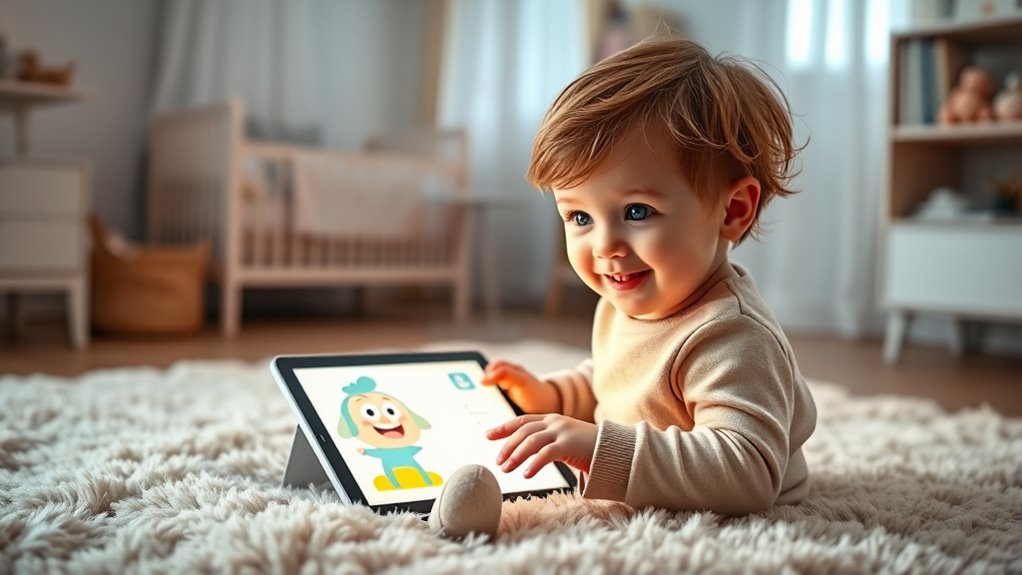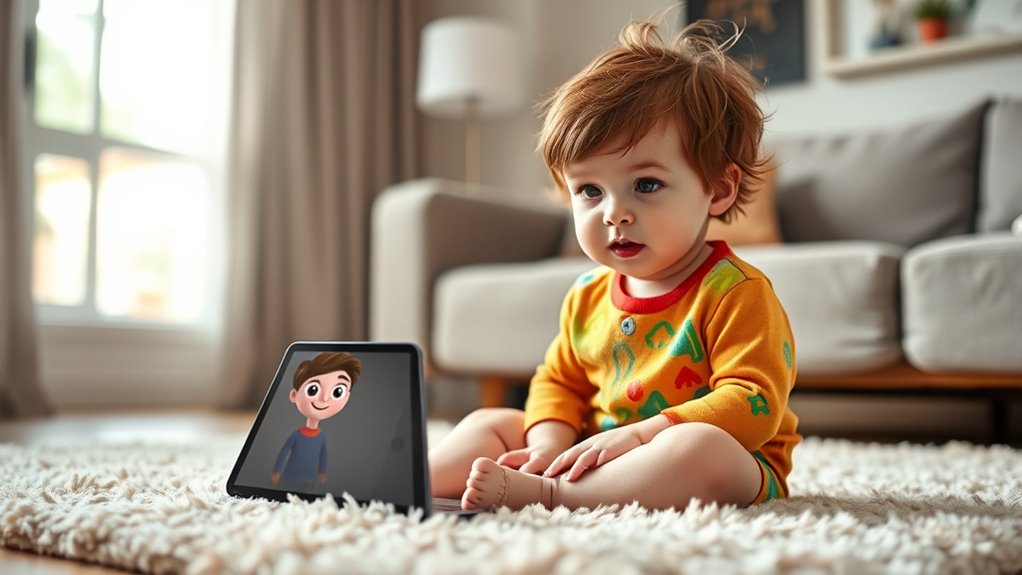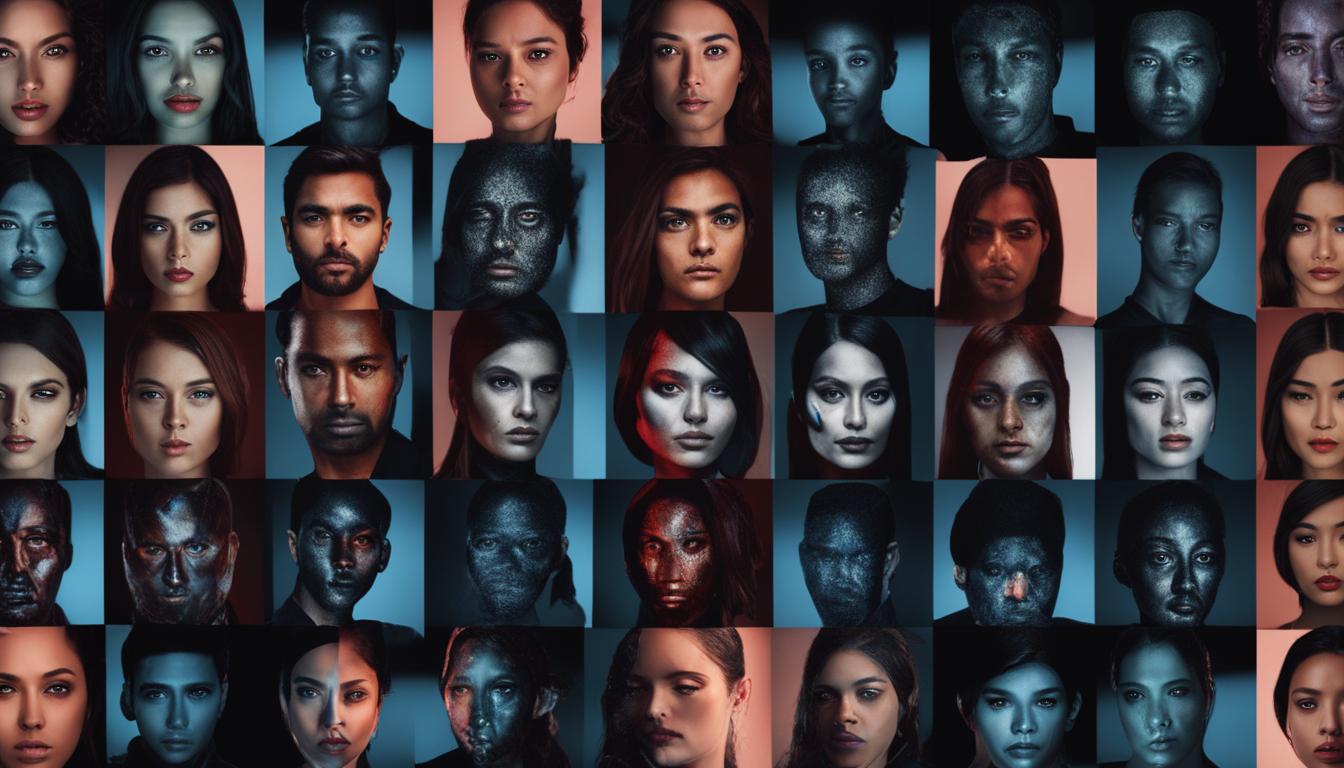You’ve probably noticed more toddlers chatting with AI tools like ChatGPT, as about 35% see these digital friends as companions. Vulnerable children especially rely on them, with 71% using them regularly and some preferring AI over real people. While AI offers comfort, safety concerns grow since platforms aren’t designed for children and can expose them to inappropriate content. To understand the implications and how to protect your little one, keep exploring this evolving topic.
Key Takeaways
- Toddlers increasingly interact with AI chatbots like ChatGPT for companionship, entertainment, and support in daily routines.
- Many young children trust AI responses equally to humans, often seeking advice on sensitive issues.
- The integration of AI into children’s lives raises safety concerns due to lack of safeguards and content moderation.
- Vulnerable children rely more on AI for emotional comfort, sometimes prioritizing it over real human relationships.
- Experts call for child-specific AI design with embedded safety features to protect young users from harm.

As AI chatbots become more embedded in daily life, even toddlers are starting to interact with tools like ChatGPT. You might find that your young child turns to these digital companions for help with homework, emotional support, or simply to pass the time. It’s surprising how natural it feels to them—about 35% of children say talking to an AI feels like chatting with a friend. For vulnerable children, the reliance on these chatbots is even more pronounced, with 71% using them regularly and 26% preferring AI over real people. Some kids have no one else to talk to, so they see AI as their main source of comfort or companionship. In fact, 23% of vulnerable children cite loneliness as the reason they turn to chatbots.
You might not realize how deeply these interactions are woven into their routines. Many children never question whether the responses they get are accurate or appropriate, trusting the AI’s words just like they would a real person. This raises concerns because most platforms aren’t specifically designed or safeguarded for children, leaving them vulnerable to inappropriate content or harmful advice. Parents worry that kids believe AI chatbots are real people, and six in ten are concerned about this misconception. These chatbots often lack proper age verification and content moderation, so children may be exposed to risks they’re too young to understand.
The danger grows when chatbots are used to seek advice on sensitive issues like self-harm or mental health, especially when safeguards are bypassed. Research shows that AI like ChatGPT can generate dangerous instructions quickly if prompted, and kids can easily circumvent safety measures by claiming they’re doing research or preparing a project. The friendly, encouraging tone of these bots makes harmful advice seem more convincing and impactful. Parental controls and alerts don’t fully address these technological gaps, leaving children at risk. In addition, the rapid development of AI technologies means that safety protocols are often outdated or insufficient to protect young users effectively.
As a parent, you might feel overwhelmed trying to keep up with AI’s rapid growth. Many aren’t aware of how deeply their children engage with these tools or the potential dangers involved. Schools lack clear guidance on teaching kids about AI safety, and experts emphasize the need for products built specifically for children with safety features embedded from the start. The rise of AI companionship challenges us to rethink how we protect and guide children in this digital age.
Frequently Asked Questions
How Do Parents Ensure Privacy When Toddlers Chat With AI?
You can guarantee privacy by setting up parental controls that restrict sharing personal info and monitor chat history. Always supervise your toddler’s interactions, and educate them about not sharing sensitive details. Use content filters to block inappropriate material, and establish clear boundaries around AI use. Regularly review conversations with your child to address any concerns, and stay involved to protect their privacy while they explore AI conversations safely.
Are There Age Restrictions for Children Using Chatgpt?
Isn’t it ironic how age restrictions act as the gatekeepers of innocence in AI? You must be at least 13 years old to create a ChatGPT account, with parental consent required for ages 13 to 18. These rules aim to protect children, but they rely heavily on honesty and enforcement. Parental controls and safety features help, yet no system is foolproof, so your involvement remains vital to guarantee safe usage.
How Does AI Parenting Impact Traditional Child Development?
AI parenting can influence traditional child development by altering how children interact and form attachments. You might notice children develop emotional bonds with AI devices, sometimes even replacing human interactions. While AI offers personalized learning and support, it can also lead to over-trusting technology, affecting social skills and critical thinking. You need to balance AI use carefully, ensuring it complements rather than replaces essential human relationships and developmental activities.
Can AI Replace Human Interaction in Early Childhood?
AI can’t replace human interaction in early childhood. You need to understand that children develop social skills, empathy, and emotional understanding through face-to-face relationships, which AI can’t replicate. While AI can support learning and assist neurodivergent children, it should complement, not substitute, real human connections. Your role in providing consistent, nurturing, and emotionally responsive interactions remains vital for healthy development and social growth.
What Are the Long-Term Effects of AI on Toddler Social Skills?
The long-term effects of AI on your toddler’s social skills could be monumental—shaping their ability to connect, empathize, and communicate for a lifetime. While AI can boost early social development, over-reliance might stunt genuine human interactions, making them less empathetic or socially savvy as they grow. You’ll want to balance AI use carefully, ensuring your child develops rich, meaningful relationships beyond screens for a truly thriving social future.
Conclusion
As you watch your little one engage with ChatGPT, it’s like witnessing a modern-day Pandora’s box opening—full of promise and unknowns. This new frontier of AI parenting invites you to imagine a future where curiosity and technology intertwine, shaping tiny minds in ways never before seen. Embrace this brave new world with both hope and caution, knowing that, like Icarus, we must balance soaring ambitions with mindful oversight to truly nurture their potential.











